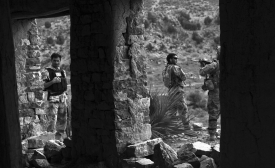Americas
I have to admit I did not expect to be writing what could be deemed a defense of Al-Hurra -- the U.S.-sponsored Arabic language television station beamed across the Arab world. Al-Hurra (which means "the free one" in Arabic) has come under scrutiny over the past few years for its potential impact on U.S. public diplomacy objectives.
Globalization is contributing to a growing international divide -- political, economic, cultural, and digital. This gap, characterized by the polarization of wealth and resources and the breakdown of shared goals and identity, has contributed to heightened instability and the generation of conflict. Terrorism and holy war have been among the reactions.
Understanding and influencing public attitudes and those who shape them, beyond the traditional diplomacy of government-to-government contact, is the "work" of public diplomacy in our globalized world.
More than ever, almost daily improvements in communications technology and the ability to have a true transnational flow of ideas and information, has transformed the conduct of public diplomacy. It has made it both more important and more challenging for the successful formation and execution of foreign policies by governments and a range of multi-national authorities.
The New York Philharmonic's recent Pyongyang concert has garnered extensive international news coverage over the momentary piercing of North Korea's thick carapace. But rather than seeking as far as the Hermit Kingdom for evidence of a truly effective use of classical music as soft power, we'd arguably do better to look in our own back yard: Los Angeles to be precise, in the guise of the L.A. Philharmonic's next music director, Gustavo Dudamel. The extraordinary young conductor is the embodiment of Venezuela's one real soft power asset. The U.S.

The effectiveness of information campaigns today will more often dictate a victory than how well bullets and bombs are put on a target. Putting information on target is more important when dealing with an asymmetric adversary that cannot – and does not need to – match the military or economic power of the United States and her allies.
Public diplomacy is no substitute for smart foreign policy, nor can it fix a myopic one. But miscalculations of both its power and place have left it a hobbled tool in our diplomatic arsenal.
Hopefully the newest designated chief of public diplomacy, Jim Glassman, understands this. His bona fides for the job are solid; but the challenges, unhappily, remain as distinct today as they did seven years ago under Charlotte Beers, the first Public Diplomacy chief of the Bush administration.
I would like to commend Congresswoman Diane Watson for organizing the Congressional Symposium on American Film and Public Diplomacy and her sponsorship of legislation that includes establishing the Johnny Grant Film Series featuring classic American cinema in U.S. embassies and missions overseas. I think it is a grand idea that allows us to tap into one of the United States' most significant contributions to culture over the past century as an element of public diplomacy outreach.
It is by now well known that President Hugo Chavez failed to garner a majority vote in the December 1st plebiscite called to authorize 69 changes to the Venezuelan constitution. This surprising defeat, the first for Chavez since his 1998 election to the presidency, will undoubtedly force a bit of soul-searching in government circles and energize the opposition, even if it is unlikely to produce significant change in the country.







